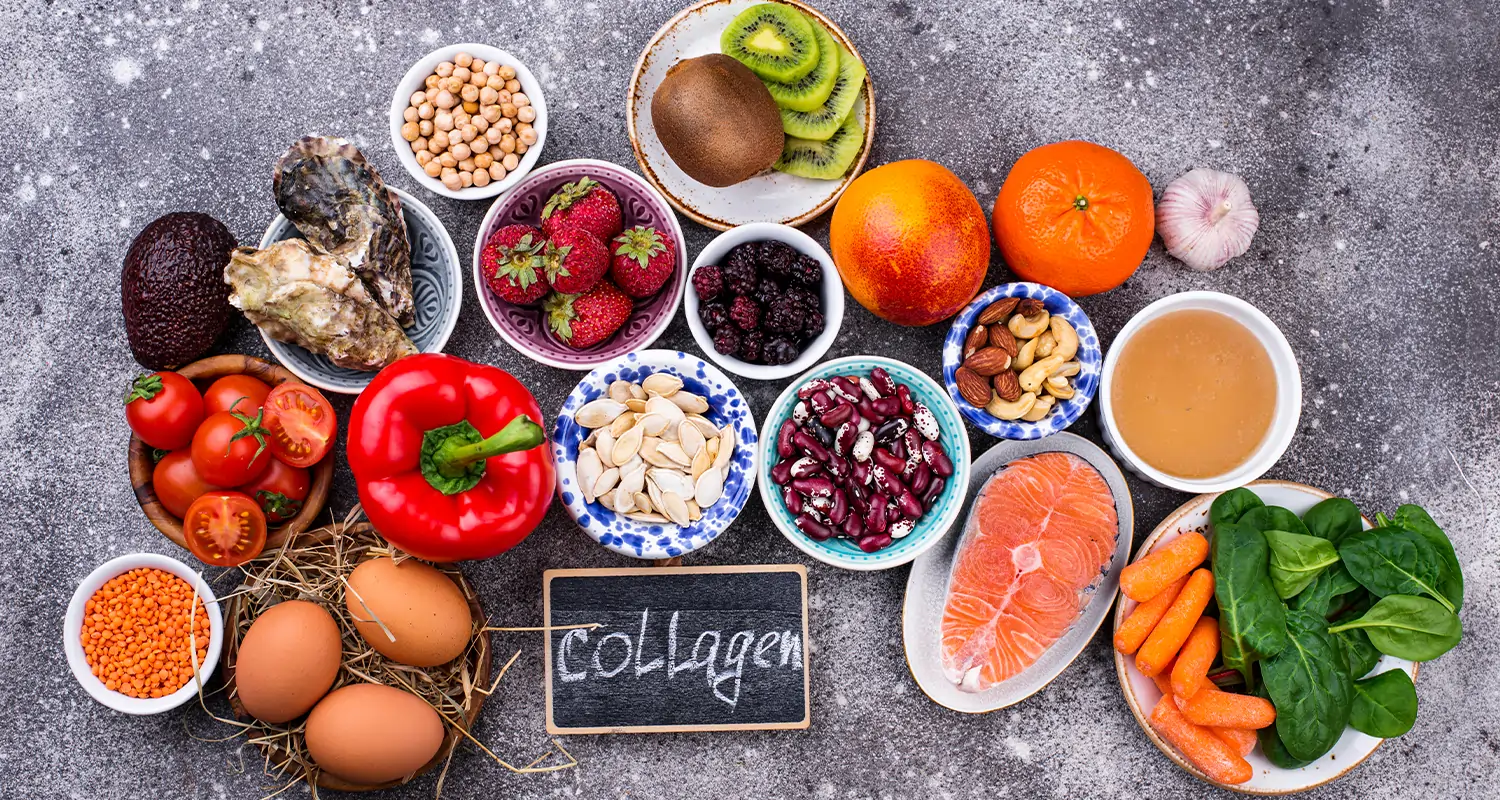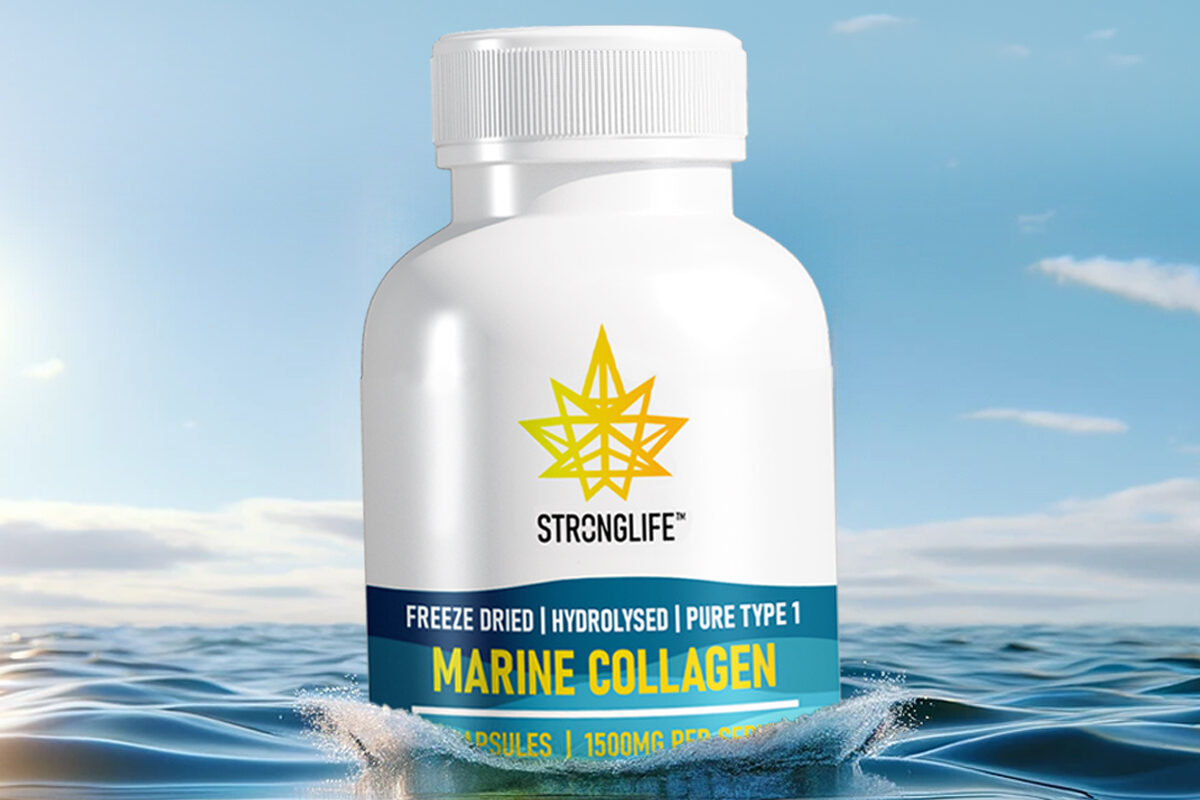
Is Collagen Good for Menopause?

Collagen plays a crucial role in maintaining skin, joints, and bone health, but its production naturally declines with age—especially during menopause. As oestrogen levels drop, collagen loss accelerates, contributing to wrinkles, joint stiffness, and reduced bone density. This raises an important question: is collagen good for menopause?
Research suggests that supplementing with collagen may help counteract some of these changes, supporting skin elasticity, joint comfort, and bone strength. In this article, we’ll explore how collagen works during menopause, the benefits it may offer, and what options there are that may help support your overall well-being.

What Happens to Collagen Levels During Menopause?
Collagen is the most abundant protein in the body, providing structure to the skin, joints, and bones. However, menopause accelerates collagen loss due to a decline in oestrogen, a hormone that stimulates collagen production. Research suggests that women can lose up to 30% of their collagen in the first five years of menopause, which may contribute to visible signs of ageing, joint discomfort, and increased osteoporosis risk.
How Does Oestrogen Affect Collagen Production?
Oestrogen helps regulate collagen synthesis, meaning that when hormone levels drop, the skin may become thinner and more prone to wrinkles. Additionally, joints may lose flexibility, and bones may weaken over time. This makes it essential to support collagen production during and after menopause.

Is Collagen Good for Menopause and Skin Health?
One of the biggest concerns for women going through menopause is skin ageing. With lower collagen levels, the skin can become drier, looser, and more prone to fine lines. Collagen supplementation may support skin hydration, elasticity, and overall texture.
Can Collagen Improve Skin Elasticity and Hydration?
Studies suggest that collagen peptides may promote skin hydration and elasticity by encouraging the body to produce more of its own collagen. Hydrolysed collagen, in particular, is easily absorbed and may contribute to smoother, more youthful-looking skin.

Is Collagen Good for Menopause and Joint Health?
Joint pain is another common issue during menopause, as collagen loss affects cartilage—the tissue that cushions joints. Without sufficient collagen, cartilage may become thinner, leading to stiffness and discomfort.
How Collagen May Support Joint Flexibility
Collagen supplements, particularly Marine Collagen, may help support joint health by providing essential amino acids that contribute to cartilage repair and maintenance.

Is Collagen Good for Menopause and Bone Strength?
Menopausal women are at an increased risk of osteoporosis due to declining bone density. Since collagen makes up about 90% of the organic content in bones, supporting collagen levels may help maintain bone strength.
Collagen and Bone Density: What the Research Says
Studies indicate that collagen peptides may help stimulate bone-forming cells and improve overall bone mineral density. For optimal bone health, it’s beneficial to combine collagen with other essential nutrients like calcium, phosphorus, vitamin D3, and selenium—all of which are found in Stronglife’s Menopause Relief Patches.

In addition to collagen support, managing menopause symptoms requires a well-rounded approach. Stronglife’s Menopause Relief Patches are designed to help ease common menopause-related discomforts, such as hot flushes, mood swings, and fatigue, using a blend of 10 natural ingredients.
| GET 20% OFF | Use Code: COLLAGEN-GOOD
-
Product on sale
 60 Natural Menopause PatchesOriginal price was: £39.99.£19.99Current price is: £19.99.
60 Natural Menopause PatchesOriginal price was: £39.99.£19.99Current price is: £19.99.
These patches contain key nutrients, including Vitamin B9, Vitamin B12, Vitamin D3, Calcium, Phosphorus, and Selenium, which may help support energy levels, bone health, and hormonal balance. Additionally, they include powerful herbal extracts like Curcumin, Dong Quai Root Extract, Liquorice Root Extract, and Black Cohosh Root Extract, which are traditionally used to support hormonal health and relieve menopause-related discomfort.
By combining Stronglife’s 5-in-1 Collagen Complex Patches with Stronglife’s Menopause Relief Patches, you may create a well-rounded approach to managing menopause symptoms naturally, addressing both collagen depletion and hormonal balance in one simple routine.

Is Collagen Good for Menopause and Muscle Mass?
Menopause is also associated with a gradual decline in muscle mass, known as sarcopenia. Collagen provides essential amino acids that contribute to muscle repair and strength. While it doesn’t replace protein sources like whey or plant-based proteins, it can be a valuable addition to muscle maintenance efforts.
Can Collagen Help Preserve Lean Muscle?
While collagen is not a replacement for traditional protein sources, it can support muscle recovery when combined with a balanced diet and resistance training. Taking Marine Collagen Capsules alongside exercise may enhance muscle strength and recovery.
-
Product on sale
 120 Hydrolysed Marine Collagen Capsules – Type 1 & Freeze-DriedOriginal price was: £39.99.£29.99Current price is: £29.99.
120 Hydrolysed Marine Collagen Capsules – Type 1 & Freeze-DriedOriginal price was: £39.99.£29.99Current price is: £29.99.
Is Collagen Good for Menopause and Hair Health?
Many women experience hair thinning during menopause, as reduced oestrogen levels can weaken hair follicles. Collagen provides essential building blocks for keratin, the protein that makes up hair strands.
How Collagen Supports Hair Growth
Collagen’s amino acids may help strengthen hair and reduce breakage. Additionally, Stronglife’s Menopause Relief Patches, which contain Dong Quai Root Extract and Black Cohosh Root Extract, are formulated to support hormonal balance, which may help with hair health.

Choosing the Right Collagen Supplement for Menopause
There are different types of collagen, with Type I and Type III being particularly important for skin and bones, while Type II supports joints. When selecting a collagen supplement, hydrolysed collagen (also known as collagen peptides) is generally the most easily absorbed.
Factors to Consider When Buying Collagen
When choosing a collagen supplement, look for:
- Hydrolysed collagen for better absorption
- Type I and III for skin and bones, Type II for joints
- Added nutrients like vitamin C, which enhances collagen synthesis
- A convenient format such as powders, capsules, or patches

Other Nutrients That Support Collagen Production
Collagen works best when combined with other supportive nutrients. Vitamin C is essential for collagen formation, while hyaluronic acid helps retain moisture in the skin.
Best Foods for Collagen Support
To naturally boost collagen production, include foods such as:
- Citrus fruits (rich in vitamin C)
- Leafy greens
- Bone broth
- Fish and lean meats
- Nuts and seeds

Potential Side Effects of Collagen Supplements
Collagen is generally safe, but some people may experience mild digestive issues. Always check for allergens, especially if the supplement contains marine or bovine collagen.
Who Should Be Cautious with Collagen?
People with allergies to fish or bovine products should opt for plant-based alternatives. If you have underlying health conditions, consult a healthcare professional before starting any new supplement.
Final Thoughts: Is Collagen Good for Menopause?
Collagen supplementation may be a helpful addition to a menopause health routine, supporting skin hydration, joint comfort, and bone strength. While it’s not a miracle cure, research suggests it can play a beneficial role in maintaining overall well-being during menopause.
Frequently Asked Questions:
Is it worth taking collagen in menopause?
Yes, collagen may support skin elasticity, joint health, and bone density during menopause. As oestrogen levels decline, collagen production decreases, leading to wrinkles, joint stiffness, and weaker bones. Supplementing with collagen can help counteract these effects, making it a beneficial addition to a menopause wellness routine.
Which type of collagen is best for menopause?
Type I and Type III collagen are best for skin, bones, and overall structural support, while Type II is beneficial for joints. Stronglife’s Marine Collagen Capsules provide hydrolysed Type I collagen, which is highly absorbable and effective for menopause support.
Should a 50-year-old woman take collagen?
Yes, women in their 50s may benefit from collagen supplementation to help maintain skin hydration, joint flexibility, and bone strength. Menopause accelerates collagen loss, so taking a high-quality supplement like Stronglife’s 5-in-1 Collagen Complex Patches can support overall well-being.
Does collagen increase estrogen levels?
No, collagen itself does not increase estrogen levels. However, it may help counteract some of the effects of estrogen decline by supporting skin and bone health.
How much collagen should a menopausal woman take daily?
The recommended dosage varies, but most studies suggest 5-10 grams of collagen peptides daily for skin, joints, and bone support. Stronglife’s Marine Collagen Capsules provide a convenient way to meet these needs.
What is the downside of collagen?
Collagen is generally safe, but some people may experience mild digestive issues or allergic reactions if sensitive to marine or bovine sources. Always check the ingredient list for allergens.
Is 55 too late to start taking collagen?
No, it’s never too late to start taking collagen. While collagen production slows with age, supplementation can still help support skin hydration, joint comfort, and bone strength.
What to avoid when taking collagen?
Avoid excessive sugar intake, as sugar can break down collagen through glycation. Additionally, ensure you’re getting enough vitamin C, as it helps with collagen synthesis.
Which food is high in collagen?
Bone broth, fish skin, chicken skin, egg whites, and leafy greens are rich in collagen-boosting nutrients.
Does HRT help with collagen?
Yes, hormone replacement therapy (HRT) may help maintain collagen levels by supporting estrogen levels, which naturally stimulate collagen production.
Do collagen supplements cause weight gain?
No, collagen does not cause weight gain. It is a protein supplement with low calories and no direct impact on fat storage.
Do collagen tablets really work?
Yes, hydrolysed collagen supplements have been shown to improve skin hydration, joint flexibility, and bone density when taken consistently.
How to tell if collagen is working?
Signs that collagen is working include:
- Improved skin elasticity
- Stronger nails
- Reduced joint discomfort
- Better hair quality
Do you age faster without estrogen?
Yes, declining estrogen levels contribute to faster skin ageing, collagen loss, and bone density reduction.
Does collagen help with menopause belly?
Collagen may support metabolism and muscle retention, which can help with overall body composition. However, maintaining a balanced diet and exercise routine is also essential.
Are there any negative effects of taking collagen?
Collagen is generally safe, but in some cases, it may cause mild bloating or digestive issues.
When should I take collagen, morning or night?
Collagen can be taken at any time, but some prefer it in the morning for an energy boost or at night for muscle recovery.
Who should avoid taking collagen?
People with allergies to fish, shellfish, or bovine products should avoid certain types of collagen. Always consult a healthcare professional if unsure.
What collagen is best for menopause?
Hydrolysed marine collagen is ideal for menopause, as it provides Type I collagen, which supports skin, joints, and bone health.
Which foods are rich in collagen?
Foods rich in collagen include bone broth, fish, chicken skin, and leafy greens, which support natural collagen production.











